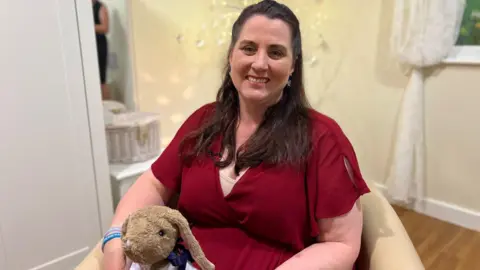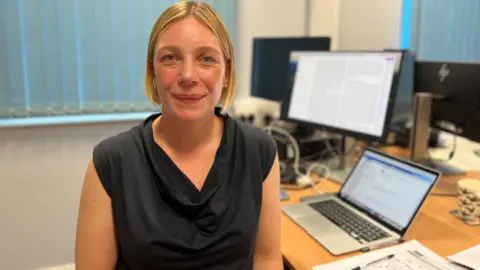Study sheds new light on pregnancy complication
 Family handout
Family handoutA groundbreaking study is bringing hope to those whose waters break early during pregnancy, researchers have said.
Previously, many of those who experienced preterm premature rupture of the membranes (PPROM) prior to 23 weeks' gestation were offered a termination, having been told there was virtually no chance of survival and that it could be dangerous to continue with the pregnancy.
But now a University of Liverpool research project prompted by one mother's experience has shed new light on the condition, which researchers said was previously "little understood".
Ciara Curran's daughter, Sinead was stillborn after Ms Curran's waters broke at 20 weeks

Ms Curran, who is from Whaley Bridge in the Peak District, developed sepsis a week after her waters broke - 20 weeks into her first pregnancy in 2010.
One week later, she went on to give birth to Sinead, who was stillborn.
She said it was "the worst day of my life", made even more difficult because she felt "so unheard".
It led her to set up the Little Heartbeats charity, to support other parents going through similar situations.
She said she felt that women needed to have the information to understand what they were going through "and I felt that didn't happen to me".
She said she was determined to help others in her daughter's memory.
"I felt that women needed to have the information to understand what they were going through and there was nothing," said Ms Curran.
'Making funeral arrangements'
Tanya Acton, from Northwich, Cheshire, also experienced PPROM, ending up in hospital after her waters broke when she was just 20 weeks pregnant.
She said it was "probably the worst thing I've ever been through in my life", with the family taken to a bereavement room believing they need to start making funeral arrangements.
"They basically told us she had 0% chance of survival," Ms Acton said.
But a day after the initial diagnosis, Ms Acton was told that her baby had a strong heartbeat, with a doctor telling her she should take things day by day.
Hope, who is now four, was eventually born at 27 weeks, weighing just over two pounds (0.9kg).
Ms Curran said the Little Heartbeats charity is a support and advocacy group to support those going through pregnancy and their families by providing them with information about the premature breaking of waters and its risks.
She said she wanted to enable parents to ask informed questions about their care.
Ms Curran approached Dr Angharad Care and Dr Laura Goodfellow from the Department of Women’s and Children’s Health at the University of Liverpool about conducting research to better understand outcomes of PRROM before 23 weeks of pregnancy.
The study of more than 300 women found that, with good care, around a quarter of the babies survived to go home.

Dr Laura Goodfellow, one of the lead investigators of the study, said they wanted to present future women and healthcare professionals with "more robust numbers" about what the chances were of the baby being born alive, leaving the hospital alive and the chances of disability were.
She said conflicting information given to those experiencing this complication added to psychological distress.
"We cannot understate the gravitas of the decision to end a wanted pregnancy for women and their families," she said.
What the study found
The research project is said to be one of the largest studies into pre-term prelabour rupture of membranes (PPROM) in pregnant women before 23 weeks' gestation.
- When PPROM occurred after 24 weeks of pregnancy, most people had a good outlook, with care underpinned by national guidelines, the researchers said.
- But the experience of the one in 1000 whose waters broke between 16 and 23 weeks of pregnancy was "little understood", with current initiatives to improve pregnancy outcomes needing to be improved, they added.
- The study also showed there was a risk of maternal death secondary to sepsis in women with early PPROM.
- It found that 10% of women who opted for termination of pregnancy after they had first seen a doctor with early PPROM still developed sepsis, compared with 13% of women who initially chose to continue their pregnancy. Researchers said this was a reminder that infection could be the cause rather than the consequence of early PPROM.
- Immediate terminations therefore might not avoid all maternal deaths, and these patients should be recognised as high risk with early involvement of senior members of staff in their care, the research concluded.
Researchers worked alongside Little Heartbeats, the Wellbeing of Women organisation and the UK Obstetric Surveillance System (UKOSS) at the University of Oxford.
The paper, ‘Preterm prelabour rupture of membranes before 23 weeks’ gestation: prospective observational study‘, was published in BMJ Medicine.
Listen to the best of BBC Radio Merseyside on Sounds and follow BBC Merseyside on Facebook, X, and Instagram. You can also send story ideas to [email protected]
